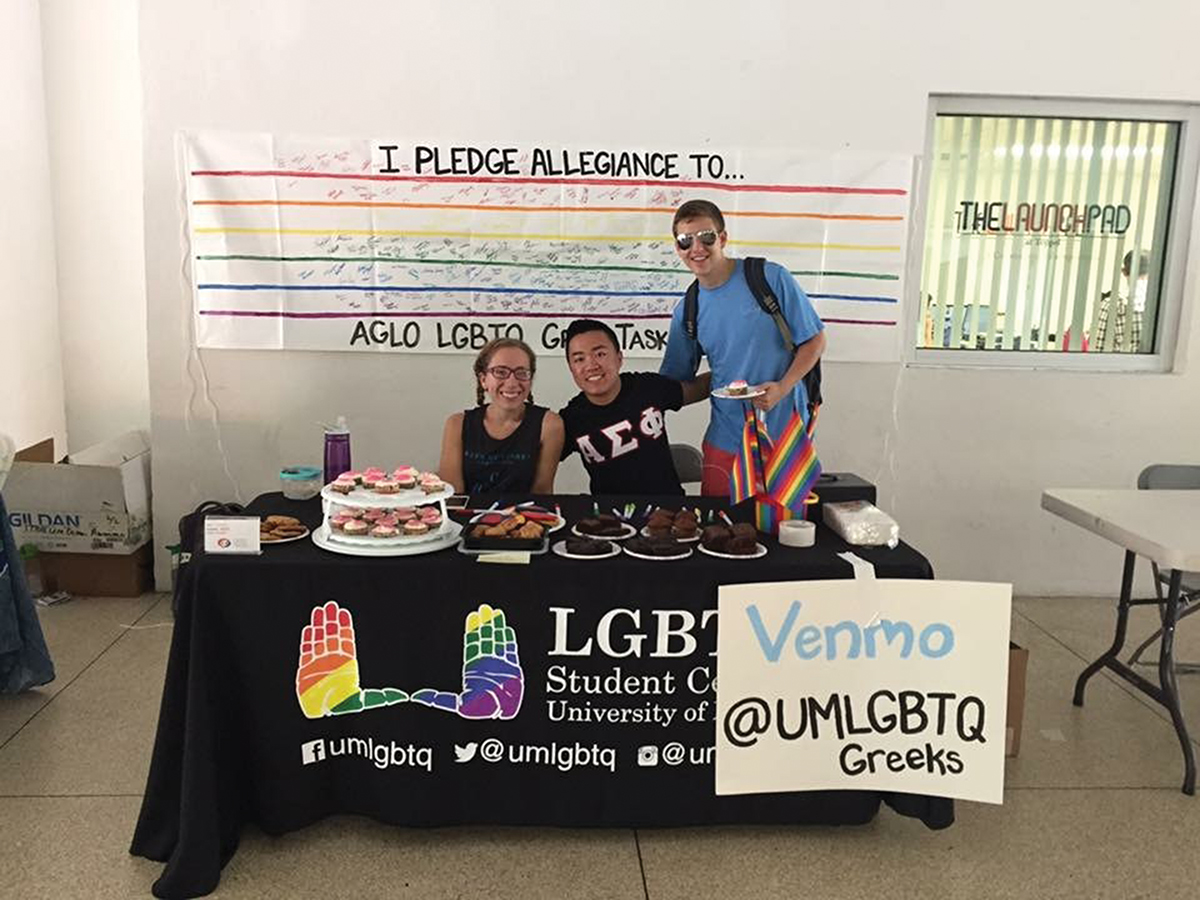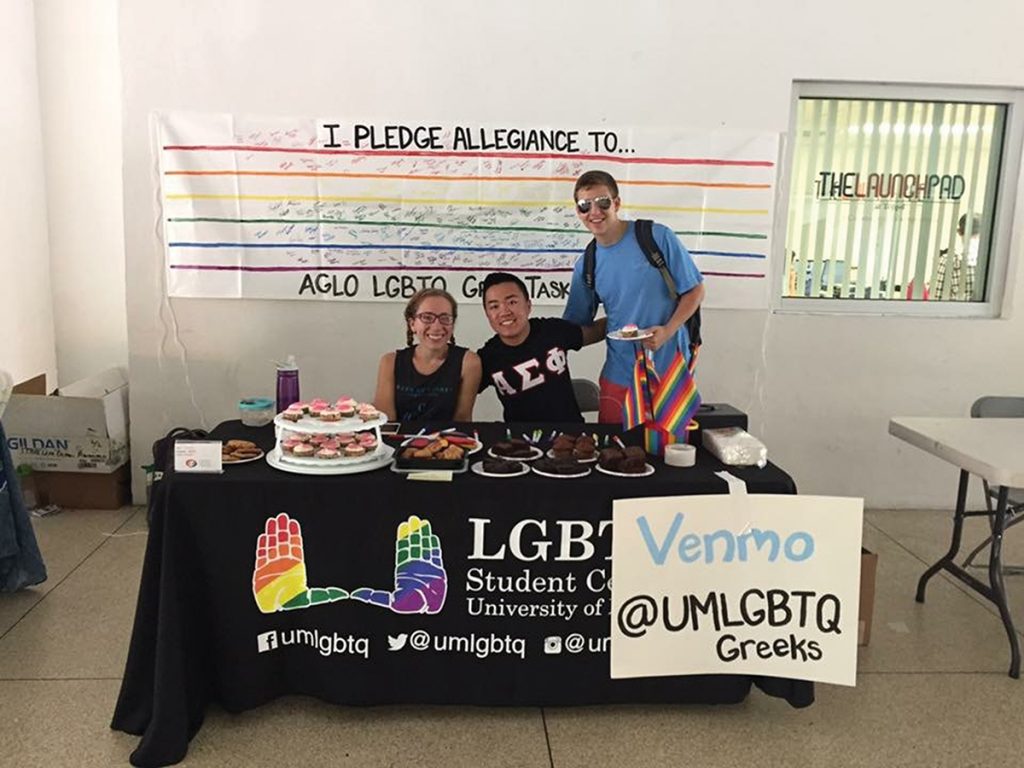

Kayle Edwards loves her sorority, Chi Omega. She also identifies as lesbian. The meeting point of her two identities – and the tension sometimes created – led her to create the LGBTQ Greek Life task force.
Edwards joined a sorority as soon as she could, in her second semester of freshman year. However, she said she didn’t feel comfortable enough to come out to her sorority sisters until sophomore year and, because she “doesn’t look gay,” people assume she’s heterosexual.
“I kind of felt like I had two identities,” Edwards said. “I was a Chi Omega and I was a lesbian, and those two things, not that they couldn’t go together, but it felt like I never had a place where they could.”
During her sophomore year, Edwards was inspired to create the LGBTQ Greek Task Force, a student-led group in which the subjects of sexuality and gender can be openly discussed, after a fellow sister in her sorority mentioned creating a more inclusive space for Greeks who identify as LGBTQ. Though Edwards said she didn’t know whether her fellow sister identified as LGBTQ, she said they both held meetings with Director of the William R. Butler Center for Service and Leadership Andrew Wiemer to discuss the possibility of creating a task force.
After her sister graduated, she took it upon herself to take that idea and make it a reality.
Edwards, a senior, said the task force’s main mission is to promote visibility of LGBTQ students in Greek Life. The task force is composed of students in Greek Life but is open to any student who wants to join.
“We’re really aiming to increase awareness that there are LGBTQ Greek members in our community,” Edwards said. “Usually you don’t hear LGBTQ and Greek together.”
It felt strange to her to constantly hear about bringing a “cute boy to semi-formals” or “buying a cute boy candy grams,” Edwards said. But even so, she said she’d heard worse in fraternities, where the terms “fag” and “no homo,” a phrase used to assert that the statement made to another person of the same-sex has no homosexual implications, are commonly used to undermine an individual’s sexuality.
The task force has been working with the LGBTQ Student Center and with the YES Institute, a South Florida non-profit focused on suicide prevention and healthy youth development, to create a dialogue about sexuality and gender.
In the past, the task force has raised funds for the YES Institute by tabling in the breezeway and selling baked goods. The group raised more than $300 for the non-profit.
Gabby Perry, a graduate assistant at the LGBTQ Student Center, said they are creating a space to engage students in speeches about becoming a more inclusive and diverse Greek community. She said it’s the first step in “challenging stereotypes, addressing divides and changing the culture.”
“LGBTQ people exist at all intersections of the university community,” Perry said. “It’s important to not only acknowledge that fact but to actively work toward bridging gaps between groups that, in the past, have served as obstacles to diversity and inclusion.”
Greek Life is a prominent staple of UM, with 2,500 students – nearly 20 percent of the student population – involved in either a fraternity or sorority.
“The whole basis of being in a fraternity or sorority is to have a home away from home,” Edwards said. “The chapter came together to take you in and pledged themselves to help you and support you no matter what.”
That means supporting LGBTQ members, too, Edwards said.
The task force gave a presentation at a symposium for incoming Greek Life members. The symposium is usually composed of alcohol and sexual assault education. For the first time last semester, the symposium added the LGBTQ education component.
Edwards said she hopes that those within Greek Life will learn that words and connotations can have an impact on those around them even if they don’t know it. She said though she’s never faced prejudice within her sorority, she’s heard subtle heteronormative references. She also said Panhellenic policies require any sister bringing another woman to formal sign a document that states that she is romantically involved with their same-sex date because they want the event to be exclusively for sisters.
She said she also hopes that leaders within Greek Life will learn to be more accountable for their words.
In the future, Edwards hopes to implement an interactive program so the task force can go to different Greek chapters and teach a course on stereotyping and homophobia. Members in the chapter will be asked to read through fake but realistic character biographies of people ranging from transgender to homophobic, and then they will discuss as a group why a particular character feels a certain way.
“We understand that education isn’t going to change someone’s whole perspective,” Edwards said. “We just want to educate on why saying those things are wrong and our hope is that we can help them realize it’s wrong.”
Students can join the task force by contacting Assistant Dean Cristina Luna at the Dean of Students office by emailing cluna@miami.edu.
CORRECTION, Tuesday, Oct 31, 12:33 a.m.: The printed version of this article misspelled the name of the student leader as Kayla Rae Edwards. Kayle Rae Edwards is the student who created the LGBTQ Greek Life Task Force.
CORRECTION, Tuesday, Oct. 31, 11:00 a.m.: The printed version of this article said students could join the task force by emailing cx100@miami.edu. The address students should contact is cluna@miami.edu.





